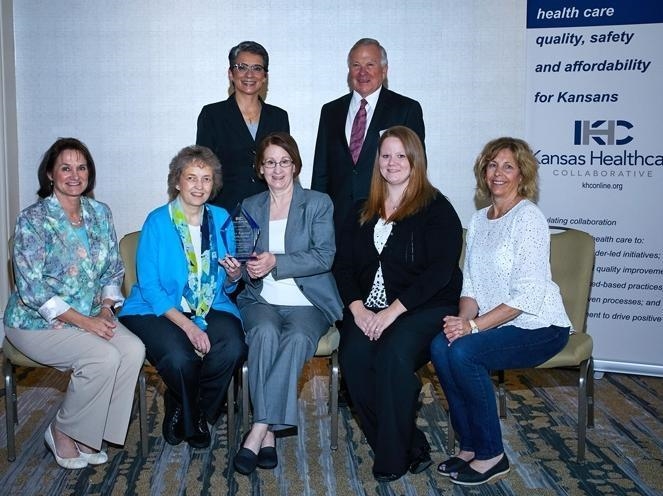Hospitals recognized for innovation and quality improvement
Topeka, Kan. – Three Kansas hospitals were recognized for their leadership and achievement in quality improvement and patient safety by the Kansas Healthcare Collaborative (KHC). The awards were sponsored by the KaMMCO Foundation and presented at the Ninth Annual Summit on Quality, jointly hosted by KHC and Kansas Foundation for Medical Care, Inc. in Wichita, May 10.
Salina Regional Health Center, Salina, Kan., received the KHC 2017 Leadership in Quality Award, presented annually to a facility that reflects KHC’s vision for improving the health of populations, enhancing the experience of patients, and reducing the per capita cost of care. The award included a cash prize of $5,000 provided by the KaMMCO Foundation. Awards of Merit were presented to Rooks County Health Center, Plainville, Kan., and Coffeyville Regional Medical Center, Coffeyville, Kan. The three hospitals recognized are among the 117 hospitals throughout the state that participate in the KHC Hospital Improvement Innovation Network.
Representatives from all three hospitals received awards presented by Kendra Tinsley, KHC executive director, and Daniel Suiter, MD, chairman of the KaMMCO Foundation board of directors.
“KaMMCO and KHC are proud to recognize and to reward the successful efforts of Kansas health care providers,” said Suiter. “By focusing on key priorities and tracking specific improvement activities, our hospitals are delivering safe, quality-driven and highly reliable patient-centered care. We applaud the work of our dedicated and innovative hospital employees. On a daily basis they seek to improve the health of their friends and neighbors in their communities. They are ever-aware of the lives they are touching and the difference they are making with every single patient.”
Tinsley said, “The Leadership in Quality award was established to recognize individuals and organizations in Kansas who dedicate time, energy and talent to ensure safe, quality care for Kansas patients. Today, we celebrate these hospitals and providers who exemplify that effort.”
 Salina Regional Health CenterThe 2017 Leadership in Quality Award winner
Salina Regional Health CenterThe 2017 Leadership in Quality Award winner
Salina Regional Health Center (SRHC) was recognized for its efforts to make fall prevention a priority, particularly falls by unassisted patients. Setting continual measurement and performance improvement initiatives, SRHC added repeated education on fall precaution for current staff and newly-hired nursing staff. Nursing leadership set up monthly reviews of the fall prevention data, looking for trends and undertaking initiatives to lower the numbers. In early 2015, SRHC showed a marked improvement, with 47 percent fewer falls. With implementation of video monitoring and increased patient and family education, SRHC tracked a 25 percent reduction in unattended falls within 12 months. By late 2016, there had been another 50 percent reduction in patient falls.
“This kind of change in culture and resulting success, implemented through ongoing process management and improvement efforts, exemplifies the goals Kansas Healthcare Collaborative has set with the Leadership in Quality Award,” said Tinsley. “Salina Regional Health Center’s prioritization of patient safety and quality by the reduction of falls in their facility has earned them this recognition.”
Two Kansas hospitals received Awards of Merit
Rooks County Health Center
Rooks County Health Center (RCHC) in Plainville, Kan., is now in its 60th year of service to Northwest Kansas. Four years ago, the Rooks County Health Center add the services of a labor doula and lactation consultant. The services were offered free-of-charge to Rooks’ obstetrics clients and anyone in the surrounding communities.
Rooks also adopted the standard “No elective deliveries prior to 39 weeks gestation.” This guideline highlights the importance of allowing babies to reach 39 weeks gestation through the elimination of elective labor inductions and cesarean sections. By helping educate providers on the significant long-term benefits to newborns, the standard is now fully accepted with 100 percent compliance for the past four years. The overall number of C-sections has been reduced from 26 percent to 10 percent. Meanwhile, RCHC has doubled the number of deliveries while decreasing the number of infant transfers from the facility. Additionally, the number of babies being breastfed has increased. Childbirth classes, lactation visits and doula training also have increased.
“By promoting cultural changes over the last four years, Rooks County Health Center has doubled its deliveries, has adopted a 100 percent acceptance of the policy of no elective deliveries before 39 weeks gestation, and made the hospital a safer and more welcoming place for patients, families and the newest members of the county,” Tinsley said.
Coffeyville Regional Medical Center
Coffeyville Regional Medical Center serves a community with one of the poorest health rankings (by county) in the state. Its service population is a high risk, vulnerable, and statistically “unhealthy” patient population where there is a lack of resources for the socioeconomically-challenged patients. These needs include child care, transportation, access to healthy food options, personal care attendants and, often, basic human needs. These problems were compounded with the closure of the nearby Independence hospital in 2016.
CRMC took on these challenges by making quality improvement, patient safety and patient experience leading priorities both within and beyond the walls of the facility, including work with KHC, its Practice Transformation Network and other organizations providing opportunities to learn new evidence-based best practices and reliable standards.
CRMC created a Patient Family Advisory Council (PFAC) in 2016, with monthly meetings of recently discharged patients and caregivers committed to improving the patient experience, adding a PFAC representative to the board, and creating a new Quality Committee, in order to transparently focus on critical performance improvement.
“Coffeyville Regional Medical Center has worked to generate a culture of patient safety, quality improvement and high reliability. This includes a belief that the future of health care is collaboration. As a result, it has found new ways to stay in touch with the patient experience and improve the health of a health-challenged community,” Tinsley said.
The three hospitals were honored at the Summit on Quality Award Luncheon. Next year’s Tenth Annual Summit on Quality will be held May 4, 2018, in Wichita.
